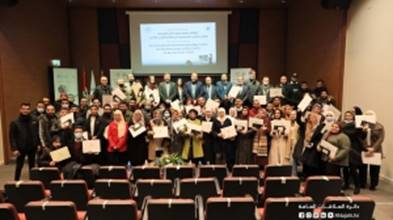
Ramallah/PNN/
More than 400 graduates and young Palestinians benefitting from the "Green jobs and Sustainable Income Opportunities for Palestinian Female and Male Youth in the Agri-food Sector" project, financed by Denmark and implemented by the Food and Agriculture Organization of the United Nations’ Coordination Office for the West Bank and Gaza Strip (FAO WBGS), were celebrated at a ceremony to mark the project’s completion held at the faculty of agriculture and veterinary medicine at An-Najah National University in Nablus, West Bank.
As part of its efforts to empower young Palestinian females and males, in 2019, Denmark and FAO partnered with the Ministry of Agriculture and four local universities, including An Najah, Al Quds, Hebron, and Khadorie, on a two-year-long endeavor to bolster green jobs and enterprise development for Palestinian youth, with a special focus on fostering social development, addressing gender inequalities, supporting innovative agri-food businesses and stimulating local green economic growth.
“With unemployment rates for young Palestinian graduates reaching 40 percent, creating green jobs for youth is vital,” said Mr. Ketil Karlsen, Danish ambassador.
An internship program was also implemented under the project, which gave 250 of the 400 graduates (183 females and 67 males) the chance to work in the agri-food sector for eight months. The majority have been permanently hired by their host companies or other employers in the agri-food sector.
“Enhancing climate-smart and green solutions, and supporting young entrepreneurs and business start-ups involved in the industry has an enormous potential, as demonstrated by the hundreds of graduates who received jobs immediately upon completing their training,” said Mr. Karlsen.
Moreover, thanks to a total investment of USD 400 000, the project has also supported 23 young Palestinians (ten females and 13 males) with the means to become owners of their own agri-food businesses.
“We are glad to have engaged both civil society and the private sector in providing employment opportunities for more than 400 graduates, including 290 females, and supporting them with the knowledge and skills needed to enhance their livelihoods and manifest their talents to unlock their unlimited potentials,” said Dr. Azzam Saleh, Head of Programme of FAO WBGS.
Denmark and FAO will continue to encourage female and male youth to engage in the high potential agri-food value chains through the rollout of a second phase of the project in 2022, which will also target youth in the Gaza Strip. This second phase will focus on strengthening pro-youth policy frameworks and linkages across the agri-food sector, engaging not only universities but also vocational training centers to develop their own agri-food-related programs, allowing for greater diversity and flexibility in the scope and reach of the intervention.
The Danish Representation opened in Jericho in 1994 and moved to Ramallah in 1998.
The overall political objective of Denmark’s engagement in Palestine is to support a peaceful solution to the Israeli-Palestinian conflict through the realization of a two-state solution. At the same time, through its engagement, Denmark is striving to promote stability in the region and improve the lives of Palestinians including women and girls, who are caught in the conflict.
The Representation is responsible for Denmark's humanitarian and development assistance in Palestine. Denmark’s support focuses on human rights and democratic accountability; green, sustainable, inclusive economic growth and decent jobs for women and young Palestinians; and resilience, peace, and stability. The expected development and humanitarian assistance amount to USD 154 million from 2021 to 2025.